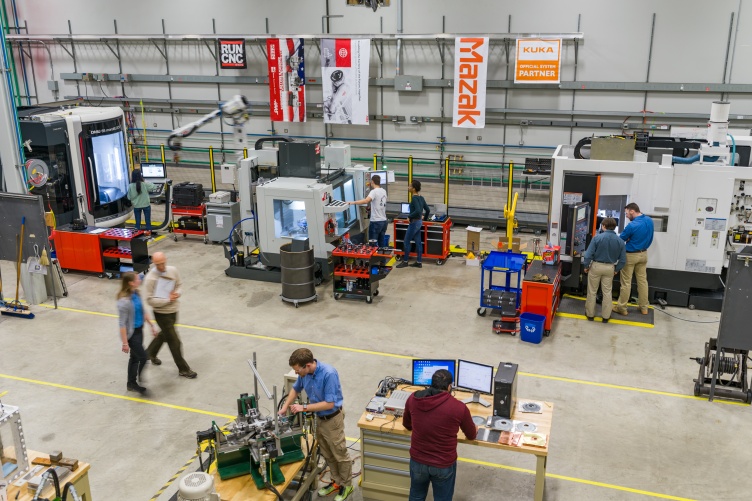
UNH research, like that conducted at the John Olson Center for Advanced Manufacturing, has a broad economic and societal impact.
UNH is the sixth most productive midsized university in the U.S. at converting research funding into economic impact, according to a recent report released by the George W. Bush Institute and the Opus Faveo Innovation Development consulting firm. UNH ranked just behind Princeton and Carnegie Mellon universities in the mid-sized category and ranked in the top 100 of all U.S. universities for innovation impact regardless of size or research budget.
“As New Hampshire’s R1 public research university, we have a responsibility to extend the knowledge we generate into societal impact,” says Marian McCord, UNH senior vice provost for research, economic engagement and outreach. “This ranking is wonderful recognition of our careful stewardship of the public’s investment in UNH’s research and innovation.”
“As New Hampshire’s R1 public research university, we have a responsibility to extend the knowledge we generate into societal impact.”
Using data from AUTM (the global technology transfer association) and other sources, the first-of-its-kind set of rankings measures the impact universities and research institutions have on the U.S. economy and society based on their innovation. According to the report, the goal in publishing the rankings is to highlight high-performing institutions so that other organizations, as well as policy makers and other leaders, can learn from their example.
UNH was recently among the top five universities nationally for total licensing transactions and is a leader in the commercialization of nontraditional creative works like copyrights and trademarks.
“UNH continually fosters a culture of innovation and entrepreneurship,” says Marc Sedam, vice provost for innovation and new ventures and managing director of UNHInnovation (UNHI). “This data-driven recognition is an important national acknowledgement that UNHInnovation’s focus on getting our research and scholarship more broadly used by society is paying off and it solidifies UNH’s role as a critical economic driver for our state.”
Sedam points out recent efforts at UNH that have reinforced engagement with industry and the surrounding communities and promoted entrepreneurial thinking and doing across campus.
“We work hard every day to drive research outputs out into world so that the work that’s being done at UNH by our outstanding researchers can have a broader impact,” says Jenna Matheny, director of technology transfer at UNHI.
The report highlights that the nation’s universities and research institutions play a pivotal role in fueling innovation and driving economic growth, but the country’s long-term economic health demands an increased commitment to improving the productivity of university research and promoting technological progress. The report concludes that success will require university leaders to prioritize research, attract talented researchers, invest in technology transfer operations, instill a culture of innovation and entrepreneurship across campus and engage with industry. The report also urges policymakers to increase public sector support for university research, support technology transfer operations and invest in integrated physical spaces that connect researchers with entrepreneurs, investors and other potential nonacademic partners.
-
Written By:
Chelsey DiGiuseppe | UNHInnovation
















































